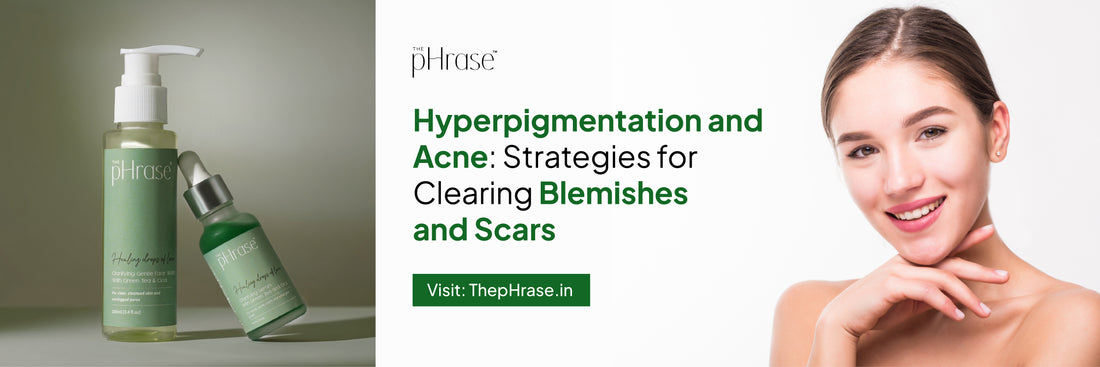
Hyperpigmentation and Acne: Strategies for Clearing Blemishes and Scars
Share
Hyperpigmentation and acne are prevalent skin concerns that affect millions of people worldwide, including in India. These issues not only impact an individual's appearance but can also take a toll on their self-esteem and mental well-being. Understanding the causes behind hyperpigmentation and acne, along with effective strategies for clearing blemishes and scars, can help individuals achieve clearer, healthier skin. This article aims to provide valuable insights into managing these skin conditions and improving skin health.
Understanding Hyperpigmentation and Acne
Hyperpigmentation refers to darkened patches or spots on the skin that result from excess melanin production. This condition can be triggered by various factors, including sun exposure, hormonal changes, certain medications, and inflammation. Post-inflammatory hyperpigmentation (PIH) is a common type that occurs after an acne breakout, where the skin darkens at the site of healed acne lesions.
Acne, on the other hand, is a skin condition characterized by the appearance of pimples, blackheads, whiteheads, and cysts. It is caused by the clogging of hair follicles with oil and dead skin cells, which can lead to inflammation and bacterial infection. Acne is most prevalent among teenagers and young adults but can affect individuals of all ages.
Strategies for Clearing Blemishes and Scars
Managing hyperpigmentation and acne requires a comprehensive approach that includes lifestyle changes, skincare routines, and, in some cases, professional treatments. Here are some effective strategies:
- Sun Protection: Sun exposure can exacerbate hyperpigmentation and acne scars. Using a broad-spectrum sunscreen with an SPF of 30 or higher every day, even on cloudy days, can prevent further darkening of blemishes.
- Gentle Skincare: Adopting a gentle skincare routine that avoids harsh scrubs and irritating ingredients can help manage acne and reduce inflammation. Look for products containing salicylic acid, niacinamide, and retinoids, which can help unclog pores, reduce acne, and lighten hyperpigmentation.
- Topical Treatments: Topical creams and serums containing ingredients like hydroquinone, kojic acid, and vitamin C can be effective in reducing hyperpigmentation. These products work by inhibiting melanin production and brightening the skin tone.
- Chemical Peels: Chemical peels that use acids like glycolic acid or lactic acid can remove the top layer of the skin, helping to reduce the appearance of acne scars and hyperpigmentation.
- Laser Therapy: Laser treatments can target melanin and scar tissue, promoting new skin growth and improving skin texture. However, laser therapy should be performed by a qualified professional and may not be suitable for all skin types.
- Microneedling: This procedure involves creating tiny punctures in the skin to stimulate collagen production, which can help heal acne scars and improve skin texture.
- Healthy Lifestyle: A balanced diet rich in antioxidants, adequate hydration, and stress management can support skin health and reduce acne breakouts.
The Importance of Consistency and Patience
Clearing blemishes and scars takes time and consistency. It's important to stick to a skincare routine and give treatments time to work, which can range from several weeks to months. Additionally, consulting with a dermatologist can provide personalized advice and professional treatments tailored to your skin's needs.
Achieving clear, healthy skin is a journey that requires the right knowledge and tools. At The pHrase, we understand the unique skincare challenges faced by individuals in India. Our range of skincare products is designed to tackle hyperpigmentation and acne, using ingredients that are both effective and gentle on the skin. Embark on your journey to clearer skin with The pHrase and experience the confidence that comes with radiant, healthy skin. Visit our website to explore our products and find the perfect solution for your skincare needs.
Navigating the complexities of hyperpigmentation and acne can be challenging, but with the right approach, achieving clearer skin is within reach. Remember, every skin is unique, so finding what works best for you is key.
FAQ
Q: What causes hyperpigmentation and acne?
A: Hyperpigmentation can be caused by sun exposure, hormonal changes, inflammation, and skin injuries, including those from acne. Acne results from clogged hair follicles due to excess oil production, bacteria, and dead skin cells.
Q: Are hyperpigmentation and acne scars permanent?
A: While hyperpigmentation and acne scars can be persistent, they are not always permanent. With proper care and treatment, their appearance can be significantly reduced over time.
Q: How can I prevent acne and hyperpigmentation?
A: Preventing acne and hyperpigmentation involves regular cleansing, using sun protection, avoiding picking at the skin, maintaining a healthy diet, and using non-comedogenic skincare products.
Q: Can home remedies be effective for treating hyperpigmentation and acne?
A: While some home remedies may provide temporary relief, they often lack the efficacy of clinically proven treatments. It's best to use products from “The pHrase” formulated with ingredients known to effectively target these skin issues.
Q: How long does it take to see results from treatment?
A: The time it takes to see improvement varies depending on the severity of the condition and the treatment method. Some people may notice changes in a few weeks, while others may need several months to see significant results.
Q: Is it necessary to see a dermatologist for hyperpigmentation and acne?
A: While mild cases can be managed with over-the-counter products, it's advisable to consult a dermatologist for severe or persistent hyperpigmentation and acne. They can provide personalized treatment plans and professional procedures.
Q: Can diet affect acne and hyperpigmentation?
A: Yes, diet can influence skin health. Foods high in sugars and dairy products may exacerbate acne in some individuals. A balanced diet rich in fruits, vegetables, and antioxidants can support skin health.
Q: Can stress cause acne and hyperpigmentation?
A: Yes, stress can trigger acne breakouts and potentially exacerbate hyperpigmentation by influencing hormone levels and inflammation in the body.
